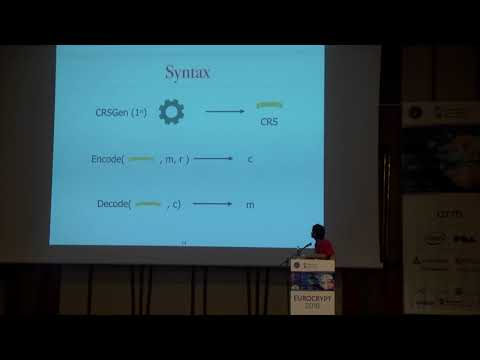Welcome to the resource topic for 2017/1061
Title:
Non-Malleable Codes from Average-Case Hardness: AC0, Decision Trees, and Streaming Space-Bounded Tampering
Authors: Marshall Ball, Dana Dachman-Soled, Mukul Kulkarni, Tal Malkin
Abstract:We show a general framework for constructing non-malleable codes against tampering families with average-case hardness bounds. Our framework adapts ideas from the Naor-Yung double encryption paradigm such that to protect against tampering in a class F, it suffices to have average-case hard distributions for the class, and underlying primitives (encryption and non-interactive, simulatable proof systems) satisfying certain properties with respect to the class. We instantiate our scheme in a variety of contexts, yielding efficient, non-malleable codes (NMC) against the following tampering classes: 1. Computational NMC against AC0 tampering, in the CRS model, assuming a PKE scheme with decryption in AC0 and NIZK. 2. Computational NMC against bounded-depth decision trees (of depth t^\epsilon, where t is the number of input variables and constant 0<\epsilon<1), in the CRS model and under the same computational assumptions as above. 3. Information theoretic NMC (with no CRS) against a streaming, space-bounded adversary, namely an adversary modeled as a read-once branching program with bounded width. Ours are the first constructions that achieve each of the above in an efficient way, under the standard notion of non-malleability.
ePrint: https://eprint.iacr.org/2017/1061
Talk: https://www.youtube.com/watch?v=IrENspmVQGE
See all topics related to this paper.
Feel free to post resources that are related to this paper below.
Example resources include: implementations, explanation materials, talks, slides, links to previous discussions on other websites.
For more information, see the rules for Resource Topics .
